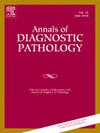与环形红细胞相关的骨髓凝胶样变:诊断陷阱
IF 1.5
4区 医学
Q3 PATHOLOGY
引用次数: 0
摘要
凝胶状骨髓转化(GBMT)是一种罕见的疾病,其特征是脂肪细胞萎缩、骨髓中细胞外凝胶状物质沉积以及相关的造血功能低下。人们对 GBMT 的潜在致病机制仍知之甚少。在此,我们描述了 3 例与环状巩膜母细胞相关的 GBMT 病例。我们通过实验室信息系统对机构档案进行了电子搜索,以确定体重指数(BMI)为本文章由计算机程序翻译,如有差异,请以英文原文为准。
Gelatinous transformation of bone marrow associated with ring sideroblasts: A diagnostic pitfall
Gelatinous bone marrow transformation (GBMT) is a rare condition characterized by adipocyte atrophy, deposition of extracellular gelatinous substance in the bone marrow and associated hypoplastic hematopoiesis. The underlying pathogenic mechanisms of GBMT remain poorly understood. Here we describe 3 cases of GBMT associated with ring sideroblasts. An electronic search of institutional archives was conducted via the laboratory information system to identify patients with a body mass index (BMI) of <18.5 who underwent bone marrow evaluation. The slides and reports for these bone marrow specimens were reviewed. Bone marrow specimens of 10 patients were identified and reviewed. Three (30 %) were found to have GBMT and ring sideroblasts, ranging from 2 to 20 %. Blasts were not increased and there was no other morphologic evidence of dysplasia. Every patient had one or more peripheral blood cytopenias. In one patient, copper deficiency was proven providing an explanation for the ring sideroblasts. To the best of our knowledge, ring sideroblasts have not been well documented in GBMT and aims to contribute to a better understanding of disease recognition and pathogenesis and also to prevent potential misdiagnosis as a myelodysplastic syndrome.
求助全文
通过发布文献求助,成功后即可免费获取论文全文。
去求助
来源期刊
CiteScore
3.90
自引率
5.00%
发文量
149
审稿时长
26 days
期刊介绍:
A peer-reviewed journal devoted to the publication of articles dealing with traditional morphologic studies using standard diagnostic techniques and stressing clinicopathological correlations and scientific observation of relevance to the daily practice of pathology. Special features include pathologic-radiologic correlations and pathologic-cytologic correlations.

 求助内容:
求助内容: 应助结果提醒方式:
应助结果提醒方式:


